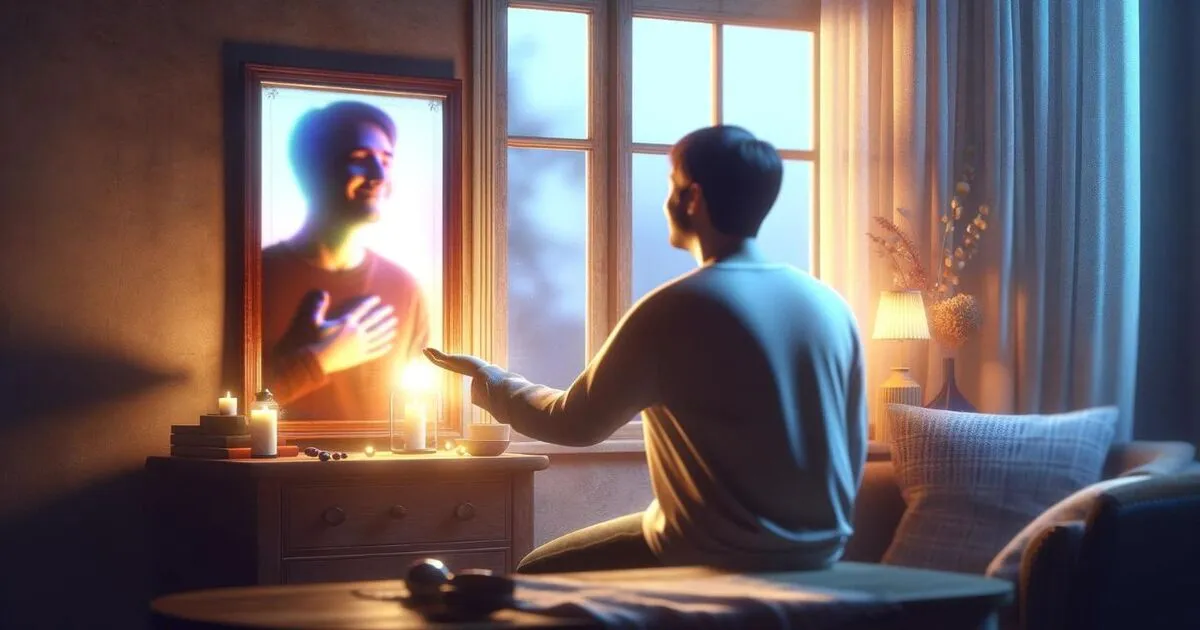Stop Self-Loathing: How To Stop Self-Hatred in Its Tracks

Ever felt like you’ve got this nagging inner critic that just won’t give you a break? Like you’re constantly under the microscope, and not in a good way? Welcome to the world of self-loathing and self-hatred.
It’s a harsh realm where you’re your own worst critic, scrutinizing every move you make and painting yourself in the bleakest light possible.
Often, this toxic mindset has roots in childhood or other early life experiences that you’ve internalized, turning them into a part of your daily mental chatter.
But it’s not just an internal thing. This self-hatred is like a persistent shadow, always lurking and ready to throw darts like “I knew I would fail” or “Why do I even try?” It’s a mental space where self-care goes to die, replaced by thoughts that you’re undeserving of anything good.
So yeah, if you’ve ever had thoughts like “I’m a loser,” or “No one wants to be around me,” you’re in the right place. This article digs deep into the darkness of self-loathing, dissecting its origins, its impact, and most importantly, how you can kick it to the curb.
What is Self-Loathing?
You know how some folks just seem to be stuck in a cycle of self-hate like they’re caught in this never-ending loop of doom and gloom? That’s because self-loathing tends to be a persistent pattern, not just a one-off episode.
It’s a gnarly blend of feeling worthlessness, hopelessness, and just plain incompetence. If you’re self-hating, you’ve probably got this inner critic that’s louder than a rock concert, constantly feeding you negative things and tearing your self-worth apart.
So, who’s most likely to get caught in this web? Well, it’s often people who:
If you’re nodding along to any of these, you’re not alone. But the good news? You’re already on the path to understanding the beast, which is step one in slaying it.

Recognizing the Signs of Self-Loathing
So, you’re wondering what’s behind this self-loathing you’ve got going on, right? Well, it’s usually a cocktail of different factors, each one adding its flavor of negativity.
We’re talking past traumas, sky-high expectations, a dash of perfectionism, and even those pesky social comparisons. Oh, and don’t forget those learned behaviors that are the cherry on top.
The Trauma Connection
For people who experience intense self-loathing, there’s often some kind of trauma lurking in the past. This could range from emotional and physical abuse to neglect.
Trauma can make the world seem like a big, scary place where trust is a luxury you can’t afford. To cope, you might develop an internal narrative that you’re worthless and unlovable. Self-loathing may become a familiar yet cruel voice in your inner critic.
If you think trauma’s the culprit behind your self-loathing, don’t hesitate to get professional help. Whether it’s a therapist or a spiritual guide, the right person can help you dig deep and find the roots of your self-hate, paving the way toward self-compassion.
The Curse of False Expectations
Wanting to fit in or excel at something is completely normal, but sometimes we set the bar so high that not even a pole-vaulter could clear it.
When we inevitably fall short, that’s when the inner critic comes in, shouting statements of self-hate and feelings of self-loathing at us.
Even when the rational part of you knows those expectations are off the charts, the self-hating thoughts persist.
People-Pleasing
It’s human nature to want to make those around us happy, but sometimes this spirals into a toxic pattern. You start believing your worth is tied to other people’s happiness.
So when you can’t meet someone’s expectations, it feels like a personal failure, leading to self-loathing thoughts that you’re unworthy of love or value.
Perfectionism
Being a perfectionist isn’t all it’s cracked up to be. Sure, it might sound like a good thing, but in reality, it’s a tightrope walk over a pit of emotional landmines like shame, loneliness, and judgment.
Perfectionism often stems from a desire to shield ourselves from these painful feelings, but in doing so, we’re just setting ourselves up for a major depressive disorder and a heap of self-loathing.
Social Comparison
Comparing yourself to others is a slippery slope. You start paying more attention to people you perceive as ‘better’ than you, and before you know it, you’re drowning in feelings of self-hate.
This is what therapists call ‘upward comparison,’ and it’s a one-way ticket to self-loathing central.
So there you have it. Self-loathing isn’t born overnight; it’s a complex concoction brewed over time, influenced by a multitude of factors. The good news? Understanding these factors is the first step in kicking self-loathing to the curb.
Feelings of Self-Hatred & Self-Loathing Thoughts
Self-hatred isn’t just a mental state; it bleeds into almost every facet of your life. It’s like a roadblock stopping you from making decisions, taking risks, and forging meaningful connections.
Low self-esteem and feelings of worthlessness can kick in, making you feel like you’re just not cut out for this whole “life” thing.
The Impact on Your Relationship with Yourself
Let’s start with numero uno: you. When you’re constantly feeding yourself a diet of negative self-talk and self-loathing, you’re bound to experience low self-esteem.
It’s hard to see anything good about yourself when your inner critic is always on the mic. You ignore the positive and focus solely on what you perceive as flaws.
The Work-Life Balance… Or Imbalance
Work-life can get super tricky when you’re battling feelings of worthlessness. You might start shying away from projects or collaborations because you’re convinced you’ll mess it up.
You’re likely to resent coworkers who seem to have it all together while you’re drowning in a sea of self-doubt.
Navigating Social Waters
Making friends when you’re weighed down by self-loathing? Tough gig. The constant barrage of negative self-talk makes it hard to even want to meet new people.
You might even come off as distant or aloof, not because you are, but because you’re trying to shield yourself from further judgment or criticism.
The Family Dynamic
Now, family is a whole other ball game. For people who hate themselves, often due to past traumas or abuses, being around family can trigger all sorts of negative emotions and memories.
Even without a traumatic past, your quest for perfectionism can make family gatherings feel like a pressure cooker, stopping you from enjoying the people who should mean the most to you.
Love in the Time of Self-Loathing
Romance. It should be all about love and connection, right? But when you’re struggling with self-loathing, getting close to someone can feel like a minefield. The fear that they’ll see your “imperfections” and judge you the way you judge yourself can be paralyzing.
When Goals Feel Like Mountains
Self-hatred has this nasty habit of making everything seem unattainable. You look at people achieving their dreams while your inner critic tells you that you’re bound to fail. This can zap your motivation to set any goals in the first place.
Decision-Making: The Struggle Is Real
Finally, let’s talk about decisions. When you’re stuck in a vortex of negative thoughts and negative self-talk, even the simplest choices can feel monumental. You’re less likely to take risks or seize opportunities, all because your self-doubt has you in a stranglehold.
In short, self-hatred and self-loathing due to various factors can make life feel like you’re walking through quicksand. But knowing how it impacts you is the first step in pulling yourself out.

How to Combat Self-Loathing
Living in the grip of self-loathing is like being stuck in a perpetual thunderstorm with no umbrella. You’re drenched in negativity, and it feels like there’s no escape. But hold up—there’s a way to stop self-loathing, silence that inner critic, and finally see the sun peek through those dark clouds.
It’s a Marathon, Not a Sprint
First off, let’s get something straight: Changing your self-view is not an overnight affair. According to Mental health professional Allie Soss, you have to give yourself time and space to identify self-loathing thoughts and patterns. Understand that you’re not just flipping a switch; you’re rewiring your whole mental setup.
The Inner Critic Takedown
Let’s tackle that inner critic—the one that just won’t let go, like a dog gnawing on a bone. If you’re dealing with negative thought patterns, chances are, that inner voice has gotten pretty darn loud, constantly playing a negative loop in your head.
So how do you hit the mute button? First things first: Take a breather. Seriously, pause and inhale deeply. This momentary break can help improve your mental state and stop you from catastrophizing.
Now, it’s time for some detective work: separate what you’re feeling from what’s true. Feelings aren’t facts, my friend. Just because you feel worthless doesn’t mean you are. It’s a crucial distinction that can help you break the cycle of the negative internal narrative.
Ever heard of Cognitive Behavioral Therapy (CBT)? If you haven’t, it might be a game-changer for you. CBT is all about identifying distorted thoughts and feelings and replacing them with more rational ones. If you can swing it, definitely consider giving it a try.
So, remember, that inner critic doesn’t have to run the show. With the right tools and mindset, you can start to turn down its volume.

Count Your Wins, Not Just Your Losses
Let’s get real about counting your wins because, trust me, they’re there—even if it doesn’t feel like it right now. When you’re caught in the quicksand of self-loathing, spotting your strengths can seem about as easy as finding Waldo in a sea of stripes.
So, if you’re feeling stuck, phone a friend. Seriously, ask someone you trust what they think is awesome about you. Sometimes we need an outside perspective to shine a light on our greatness.
The goal here isn’t just a one-off ego boost. Nah, it’s about making it a daily ritual to spot something—anything—positive about yourself. Think of it as your daily dose of self-love. And guess what?
Doing this consistently can help improve your overall vibe and keep you from catastrophizing every little thing.
It’s like Soss puts it: Once you get the hang of acknowledging even just one good thing about yourself each day, it kinda snowballs.
Before you know it, you’ll start noticing more and more positives. So start small, but start today. It’s one of the most effective ways to combat self-loathing and switch up your mental soundtrack.
Reality Check Those Negative Thoughts
Alright, let’s talk about how to wrestle those negative thoughts to the ground. You know the ones I mean, those that have you catastrophizing and spiraling into thoughts like “I’m useless” or even darker places like self-harm. Here’s the deal: it’s all about reframing those thoughts.
So, let’s say you find yourself thinking, “I’m the worst at this!” Hold up—before you go down that rabbit hole, challenge that thought head-on. Replace it with something more balanced, like, “Hey, I’m doing my best here, and the more I practice, the better I’ll get.”
It’s a mental pivot, a way to steer your thoughts onto a more positive track. And the best part? Doing this regularly can help improve your overall mindset.
Now, you might be wondering, “Do I have to nail this from the get-go?” Nah, you don’t. Consistency is the name of the game, not perfection. Starting small is fine. The key is to keep at it.
You see, combating negative thoughts is a process, and it’s normal for those old thought patterns to resurface. But each time you catch yourself and reframe, you’re chipping away at a lifetime of negative conditioning.
It’s like mental fitness; you have to work out those brain muscles to see improvement. So don’t sweat it if you’re not an instant Zen master; it’s all about the journey.

Mastering the Art of Saying “Thanks”
When you’re swimming in a sea of self-loathing, receiving a compliment can feel as outlandish as a penguin in a desert. It’s like your brain doesn’t know how to compute it.
You might feel uncomfortable, maybe even vulnerable, and your first instinct might be to dismiss it or downplay it.
Here’s the deal: Accepting compliments is like a skill you’ve got to hone. At first, it’s gonna feel weird, maybe even awkward. But with a little practice, you can get better at it. Next time someone throws a kind word your way, try just saying “thank you” and let it marinate.
No need to deflect or follow it up with something self-deprecating. Just take the compliment and let it sit there, in your mind, even if just for a second.
So go ahead, challenge yourself to let the good vibes in. It’s a tiny yet impactful step in your journey to stop self-loathing.
Subscribe to Create Higher Vibrations!
Get Inspiration and Practical advice straight to your inbox.
Learn Self-Compassion while Implementing Self-Love
When you’re knee-deep in self-loathing, the whole idea of self-compassion might seem like a foreign concept. Like, how do you even start being nice to yourself when all you hear inside your head is a constant barrage of negativity?
Well, here’s a simple way to look at it: Imagine your best friend just messed up. Would you go full drill sergeant on them? Nah, you’d probably give them a pep talk, reminding them that they’re only human and it’s cool to make mistakes.
That’s practicing self-compassion in a nutshell. Extend the same understanding and kindness to yourself that you’d offer to a close friend. And don’t just stop at compassion—throw in a little self-love too. Because you’re not just aiming for “I’m not that bad,” you’re going for “I’m pretty awesome in my unique way.”
And let’s talk about accepting compliments for a second. If you’re swimming in a sea of self-hate, a compliment can feel like a lifebuoy that you’re not sure you should grab. It’s awkward, kinda like watching a cat trying to tap dance.
But here’s the thing: the next time someone throws a compliment your way, just say “thank you.” Let it land. Let it sink in. It’s a small but impactful way to practice both self-compassion and self-love, two essential ingredients in the recipe for a happier you.
The Power of Now and Forgiveness
Self-loathing is a pattern that often has you stuck in the past, reliving all your worst moments. But the past is a place of reference, not residence. Focusing on the here and now, and giving yourself a pat on the back for how far you’ve come, can work wonders for your mental state.
Whether you’re dealing with a mental health condition, a personality disorder, or just a harsh inner world, remember that progress is possible. It’s all about taking small steps, acknowledging the good, and giving yourself the compassion you deserve. And if you find you can’t do it alone, professional help is always an option worth considering.
Final Thoughts
Remember, you’re not alone in this. Many people experience self-loathing at some point, but you’re able to break free from it. This journey might be a long one, but it’s worth taking. If you would rather try talking to someone who has been through it and broke free then schedule an appointment today!









